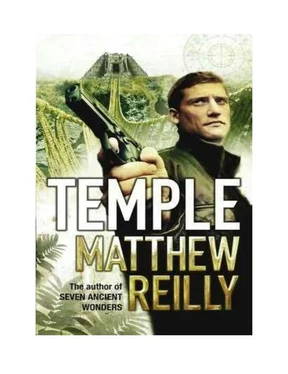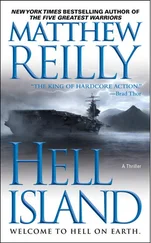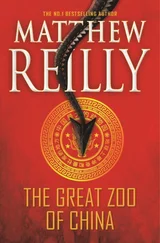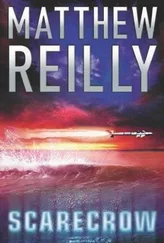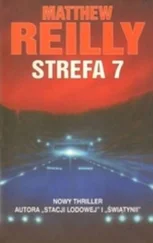SIXTH MACHINATION
Tuesday, January 5, 1910 hours
The two river craft motored slowly across the river’s surface toward the abandoned mine. One of the vessels was a long sleek speedboat, the other, a battered looking little seaplane, with only one pontoon hanging down from its right wing. The world was silent, the river calm. Leonardo Van Lewen and Doogie Kennedy peered out from their respective cockpits, stared at the deserted mine in front of them. Slowly, they both brought their vessels in toward the riverbank, ran them gently aground. They had heard the hypergolic explosion and now they saw the mine—the immense brown earthen crater—and the plume of black smoke rising from the charred box shaped shell hanging in its centre. There was no one in sight. Nothing stirred. Whatever had happened here was well and truly oven The two Green Berets jumped out of their vessels and walked cautiously over to the collection of old warehouse like buildings at the edge of the canyon, guns in hand. Then, abruptly, Renée appeared from a door in one of the buildings. She saw them instantly, came over, and the three of them stood together at the edge of the canyon, staring out at the blackened remains of the control booth.
‘What happened here?’ Van Lewen asked.
‘Ehrhardt used the idol to arm the Supernova. Then he set it to detonate,’ Renée said, her voice sad and soft. ‘Professor Race managed to stop the detonation sequence, but no sooner had he neutralised the Supernova than the whole cabin just exploded.’
Van Lewen turned to look out at the destroyed control booth, at the last place William Race had been seen alive. ‘The device was in there?’ he asked.
‘Uhhuh,’ Renée said. ‘You wouldn’t have believed it. He stopped the countdown. He was amazing.’
‘What about the idol?’
‘Destroyed in the blast, I presume, along with the Supernova and Professor Race.’
There came a rustling sound from their right. Van Lewen and Doogie spun, guns up. But when they turned, they saw nothing but trees and foliage. And then suddenly a drumlike cylindrical object—a capsule of some sort, about the size of a regular garbage bin dropped out of the upper branches of a tree and bounced softly onto the thick foliage about twenty yards away from them. Van Lewen, Renée and Doogie all frowned, went over to it. The capsule must have been inside the control booth when it blew, and been blasted all the way here by the concussion wave. The warhead capsule rolled to a halt in the foliage, and ten, oddly, it began to wobble back and forth, as if there were someone inside it wriggling around, trying to get out— Suddenly the lid of the capsule popped open and Race tumbled out of it and went sprawling butt first onto the wet, muddy ground.
Renée’s face broke out into a thousand watt grin and she and the two Green Berets rushed over to where Race was lying in the foliage. The professor lay on his back in the mud—soaking wet and exhausted beyond belief. He was still wearing his cap and his black kevlar breastplate. He looked up at his three comrades as they came over, offered them a tired half smile. Then he pulled his right hand out from behind his back and placed an object on the ground in front of him. Droplets of water glistened all over it, but there was no mistaking the shiny black and purple stone and the fierce features of the rapa’s head that had been carved into it. It was the idol. The Goose flew through the air, soaring gracefully over the Amazon rainforest. It was heading west in the early dark of night. Back toward the mountains, back toward Vilcafor. Doogie sat up front in the cockpit, flying the plane, while Van Lewen, Race, Renée and the wounded Uli sat in the back. Race pondered his escape from the control booth. In the five seconds he’d had between disarming the Supernova and the mixing of the hypergolic fuels, he had desperately searched the cabin for a way out. As it happened, his eyes fell upon one of the warhead capsules—a container capable of withstanding 10,000 pounds per square inch of pressure since its purpose was the protection of explosive nuclear warheads. With nothing else to call on, he’d dived for it—snatching the idol sitting on the workbench on the way and snapping shut the capsule’s lid just as the five second countdown expired. The fuels mixed and the control booth blew and he was launched high into the sky, inside the capsule. Thankfully, it had landed relatively softly in the trees surrounding the mine. But he was alive and that was all that mattered. Now, as he sat in his seat in the back of the seaplane, Race also held in his hands a tattered leather bound book that he had found in the boathouse after his spectacular escape. It had been sitting on a shelf inside the office overlooking the mine. It was a book that he’d insisted on searching for before they headed back to Vilcafor. It was the Santiago Manuscript. The original Santiago Manuscript—written by Alberto Santiago in the sixteenth century stolen from the San Sebastian Abbey by Heinrich Anistaze in the twentieth, and copied by Special Agent Uli Pieck of the Bundes Kriminal Amt not long after that. As he sat in the back of the little seaplane, Race gazed at the manuscript in a kind of subdued awe. He saw Alberto Santiago’s handwriting. The strokes and flourishes were familiar, but now he saw them on beautifully textured paper and written in rich blue ink, not some harsh, scratchy photocopy. He wanted to read it immediately, but no, that would have to wait. There were some other things he had to settle first.
‘Van Lewen,’ he said.
‘Yes.’
‘Tell me about Frank Nash.”
‘What?’
‘I said, tell me about Frank Nash.’
‘What do you want to know?’
‘Have you worked with him before?’
‘No. This is my first time. My unit was pulled out of Bragg to come on this mission.’
‘Are you aware that Nash is a colonel in the Army’s Special Projects Unit?’
‘Yeah, sure.’
‘So you knew it was a lie when Nash came to my office yesterday morning with a DARPA ID and a story saying that he was a retired Army colonel now working with the Defence Advanced Research Projects Agency?’
‘I didn’t know he said that.’
‘You didn’t know?’ Van Lewen looked at Race honestly.
‘Professor Race, I’m just a grunt, okay. I was told that this was to be a protective assignment. I was told to protect you. So that’s what I’m doing. If Colonel Nash lied to you, I’m sorry but I didn’t know.’
Race clenched his teeth. He was pissed as hell. He was furious at having been tricked into coming along on the mission. In addition to being angry, however, he was also determined to know everything, for if Nash wasn’t really with DARPA then it raised a whole lot of other questions. For instance, what about Lauren and Copeland? Were they with Army Special Projects, too? Even closer to home were the questions regarding how Race himself had come to be a part of the mission. After all, Nash had claimed to have been put onto him by his brother Marty. But Race hadn’t even seen his brother in almost ten years. Strangely, Race found himself thinking about Marty. They’d been close as kids. Although Marty had been a good three years older than him, they had always played together— football, baseball, just plain running around. But Will had always been better at sports, despite the age difference. Marty, on the other hand, was easily the cleverer of the two boys. He’d excelled at school and been ostracised for it. He wasn’t handsome, and even as a nine year old he was the image of his father, all hunched shoulders and thick dark eyebrows, with a permanently severe expression that was reminiscent of Richard Nixon. Conversely, Race had his mother’s easy good looks— sandy brown hair and sky blue eyes. As teenagers, while Will would go out on the town with his friends, Marty would just stay at home with his computers and his prized collection of Elvis Presley records. By age nineteen, Marty hadn’t even had a girlfriend. Indeed, the only girl he’d ever liked—a pretty young cheerleader named Jennifer Michaels—had turned out to have a crush on Will. It had devastated Marty. College came and while his schoolyard tormentors went off to become bank tellers and real estate agents, Marty had headed straight for the computer labs at MIT—fully paid for by his father, a computer engineer. Race on the other hand—intelligent for sure but always the lesser academically—would go to USE on a half sports scholarship. There he would meet, court and lose Lauren O’Connor and, in between all that, study languages. Then came their parents’ divorce. It happened so suddenly. One day, Race’s father came home from the office and told his mother that he was leaving her. It turned out he’d been having an affair with his secretary for almost eleven months. The family split in two. Marty, then twenty five, still saw their father regularly— after all, he had always been his old man’s son both in looks and manner. But Race never forgave his father. When he died of a heart attack in 1992, Race didn’t even go to the funeral. It was the classic American nuclear family—nuked from within. Race snapped out of it, returned to the present, to a sea plane flying over the jungles of Peru.
Читать дальше
